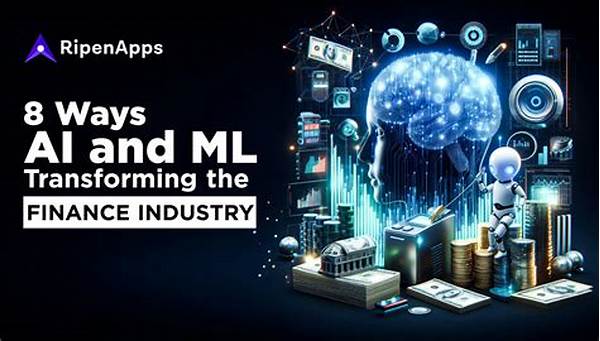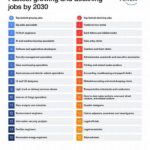In the ever-evolving world of finance, the integration of artificial intelligence (AI) stands at the forefront of innovation and transformation. The finance industry, long perceived as steeped in tradition and rigid methodologies, is undergoing a paradigm shift fueled by AI’s capabilities. This transition is changing everything from how transactions are executed to how investments are managed, promising unparalleled efficiency and accuracy. Imagine a world where financial institutions can predict market movements, assess creditworthiness in seconds, and offer personalized financial advice at scale. This is no longer a vision of the future but a present reality, thanks to AI. By exploring how AI impacts the finance industry, we can uncover the drivers of this transformation and the promising opportunities that lie ahead for financial institutions, investors, and consumers alike. Let’s delve into the dynamic realm of AI within finance, with its potential to redefine the industry’s future.
Read More : The Role Of Ai In Environmental Protection
The finance industry, known for its dependency on precise data analysis and risk assessment, finds AI to be an indispensable tool. AI algorithms are adept at processing large datasets rapidly and efficiently, enabling financial analysts to make informed decisions faster than ever. This is fundamentally reshaping the investment landscape, where traditional spreadsheet-decked desks are giving way to real-time analytics and automated trading systems. Furthermore, cutting-edge AI models can analyze years of market data in an instant, spotting trends and patterns that elude human analysts.
On top of that, AI introduces an unprecedented level of personalization in financial services. With AI-powered chatbots and virtual advisors, banks and financial institutions can deliver tailored customer experiences that are revolutionizing customer interaction. In an industry where customer satisfaction is paramount, AI offers a level of service personalization that cultivates customer loyalty and expands the client base. The question of how AI impacts the finance industry is answered by its capacity to enhance customer relationships through deeper insights and intuitive service delivery.
Additionally, the integration of AI in finance brings robust security measures to the forefront. AI systems are increasingly employed for fraud detection, harnessing machine learning algorithms to identify anomalies and potential threats. By learning from vast amounts of historical transaction data, AI can detect fraudulent activities in real-time, providing enhanced security for financial institutions and consumers. More than just strengthening trust, this also assures customers about the safety of their transactions and personal data, emphasizing how AI impacts the finance industry by elevating security protocols.
The Future of Finance: AI’s Expanding Role
As AI continues to advance, its role in the finance industry is set to grow even more significant. From streamlining operations to innovating financial products, the possibilities appear infinite. The power of AI to transform data into actionable insights promises to redefine what it means to work in finance. Financial entities that harness AI for strategic advantage are paving the way for a more dynamic and resilient industry. It’s apparent that understanding how AI impacts the finance industry is essential for anyone looking to navigate its future landscape, and with continued innovation, only time will tell the full extent of AI’s influence.
How AI Impacts the Finance Industry: A Discussion
AI’s integration into the finance sector is shaking up traditional norms and offering new paths to efficiency and profitability. For those who view finance as merely a numbers game, prepare to reshuffle your deck because AI is revolutionizing strategies and approaches. In this discussion, we will decode how AI impacts the finance industry and the avenues it opens for stakeholders across the board.
AI and automation are reshaping finance by converting time-consuming manual processes into streamlined, autonomous systems. Remember the stress of rectifying errors in complicated spreadsheets? With AI, such drudgery is a relic of the past. AI systems now automate financial reporting, ensuring accuracy, reducing human error, and saving time. This shift liberates analysts to focus on interpretation rather than data entry. With more time to think critically, analysts can innovate and pivot strategies on the fly, highlighting the profound impact of AI in the finance industry.
An exciting dimension of AI in finance is its turbocharged analytical capability. Imagine trying to process the sheer volume of global financial markets data at the speed required to stay competitive. Impossible? Not for AI. These algorithms analyze massive datasets at breakneck speed, uncovering trends and predictive insights that humans might miss. It’s like giving financial institutions a crystal ball, providing a glimpse into potential futures, and enabling preemptive strategies that can outpace market changes.
The Emotional Advantage of AI in Finance
Interestingly, AI also offers an emotional advantage, transforming customer interactions by offering empathetic, human-like responses. AI-powered chatbots and virtual assistants are more than just a novelty; they provide real-time support while reducing wait times and handling inquiries with precision and consistency. This contributes to a positive customer experience, which in turn fosters loyalty. Moreover, AI’s knack for predicting customer needs offers opportunities to cross-sell and upsell effectively, amplifying profitability without resorting to hard sell tactics—a crucial factor in how AI impacts the finance industry.
Financial security has always been a top priority and AI’s contribution cannot be overstated. Fraud detection is a significant area where AI shines, protecting institutions and their customers alike. By evaluating transaction patterns and customer behavior, AI can flag suspicious activities much faster than traditional methods. This proactive approach not only deters fraud but also reassures customers, who feel safer in their financial dealings. This facet showcases one of the many critical ways AI impacts the finance industry by fortifying trust.
The Social Implications of AI in Finance
With all its advantages, AI’s emergence in finance brings societal implications. As AI takes over tasks once handled by humans, there’s an ongoing debate about job displacement. However, it’s also worth considering the creation of new roles dedicated to managing and improving AI systems. While some fear job loss, others see an opportunity for education and reskilling, preparing financial workers to thrive in an AI-enhanced environment. The discussion about how AI impacts the finance industry can’t sidestep these dialogues regarding the future of work and education.
Looking ahead, the finance industry must embrace AI not as a rival but as a collaborator. Those who leverage AI strategically stand to gain a significant competitive edge, while those slow to adapt risk being left behind. The narrative of how AI impacts the finance industry is just beginning, but the groundwork laid today will determine the innovative strides of tomorrow. For financial professionals and institutions alike, readiness to evolve alongside AI is not just advantageous; it’s imperative.
Examples of How AI Impacts the Finance Industry
The Structure of AI’s Influence in Finance
The integration of AI in the financial industry speaks to a strategic pivot that drives growth and innovation on all fronts. Much like the intricate dynamics of a financial market curve, AI’s influence spreads across multiple sectors, encapsulating everything from customer relations to internal processes. The sophistication of AI tools allows finance professionals to channel data insight into actionable strategies—bridging the gap between technology and profitability.
Furthermore, AI’s predictive capabilities are a game-changer, allowing financial services to anticipate customer needs and market trends with unprecedented accuracy. Rather than dwelling solely on historical data, AI focuses on real-time analysis and future possibilities—offering a dynamic approach to financial decision-making. Institutions armed with AI stand to transform operational effectiveness and customer engagement, showcasing yet another layer of how AI impacts the finance industry.
As institutions race to integrate AI-driven methodologies, their overarching architecture must accommodate growth and adaptation. Clearly, AI is not just an ancillary tool but a core component in redefining financial strategies and client relations. The narrative is not merely about adapting to advanced technology but leveraging it to redefine industry standards. Indeed, understanding how AI impacts the finance industry requires a willingness to engage with its technology-driven blueprint, embracing change as a pathway to innovation.
Navigating the Waves: Preparing for AI in Finance
How financial institutions navigate the AI transition is vital to their future success. Institutions must not only adopt technology but ensure their workforce evolves alongside it. Education and training are pivotal; empowering employees to harness AI tools effectively will facilitate a seamless transition. Furthermore, collaboration with tech partners can help institutions stay at the cutting edge of AI developments, ensuring strategies align with emerging trends and opportunities, encapsulating yet another dimension of how AI impacts the finance industry.
To close, the finance industry stands at the cusp of an AI revolution—one with the potential to redefine roles and enhance performance in unprecedented ways. It is an invitation for institutions to embrace innovation and transform obstacles into opportunities. As AI continues to evolve, those who adapt and grow alongside it will not only survive but thrive, leading the charge into the future of finance. Understanding and leveraging how AI impacts the finance industry is no longer a choice but a mandate for sustainable success.
7 Tips on How AI Impacts the Finance Industry
1. Invest in AI Training: Equip your team with the necessary skills to operate AI tools effectively.
2. Leverage AI for Customer Insights: Use AI to analyze customer data and enhance the personalization of services.
3. Automate Routine Tasks: Implement AI to handle repetitive tasks, freeing valuable human resources for strategic initiatives.
4. Enhance Fraud Detection: Utilize AI’s real-time monitoring to safeguard against fraudulent activities.
5. Optimize Data Management: Employ AI for data analysis to gain actionable insights swiftly.
6. Innovate with New Products: Use AI to inspire the creation of innovative financial products and services.
7. Embrace AI in Risk Management: Predict and manage risks more effectively with AI’s analytical capabilities.
AI’s profound impact on the finance industry is more than mere technological advancement—it is a redefinition of how business is executed, projecting us towards a digitized horizon. The juxtaposition of traditional financial strategies with AI’s transformational capacity renders a unique canvas of possibilities. Embracing AI is not just about staying competitive; it’s about pioneering paths that were once deemed science fiction.
As AI continues to weave its way into the fabric of financial institutions, preparing for its full integration involves a strategic blend of education, innovation, and adaptability. The need for continuous learning and the willingness to pivot with technological trends mark the hallmark of a modern financial entity. This era of AI-driven finance opens doors to unprecedented developments in decision-making, risk assessment, and customer satisfaction, effectively illustrating how AI impacts the finance industry with broad strokes of opportunity. The call to action is clear: embrace AI today, and lead with innovation tomorrow.
Financial institutions and their clients stand on the brink of this AI-led transformation. Insights from AI are leading to informed decisions that minimize risk and maximize growth. For stakeholders eager to ride this tidal wave of change, the momentum is palpable and the stakes are high. Achieving this effectively requires addressing the profound ways how AI impacts the finance industry, weaving a tapestry of advancements that herald a new era of financial prowess and strategic excellence.


